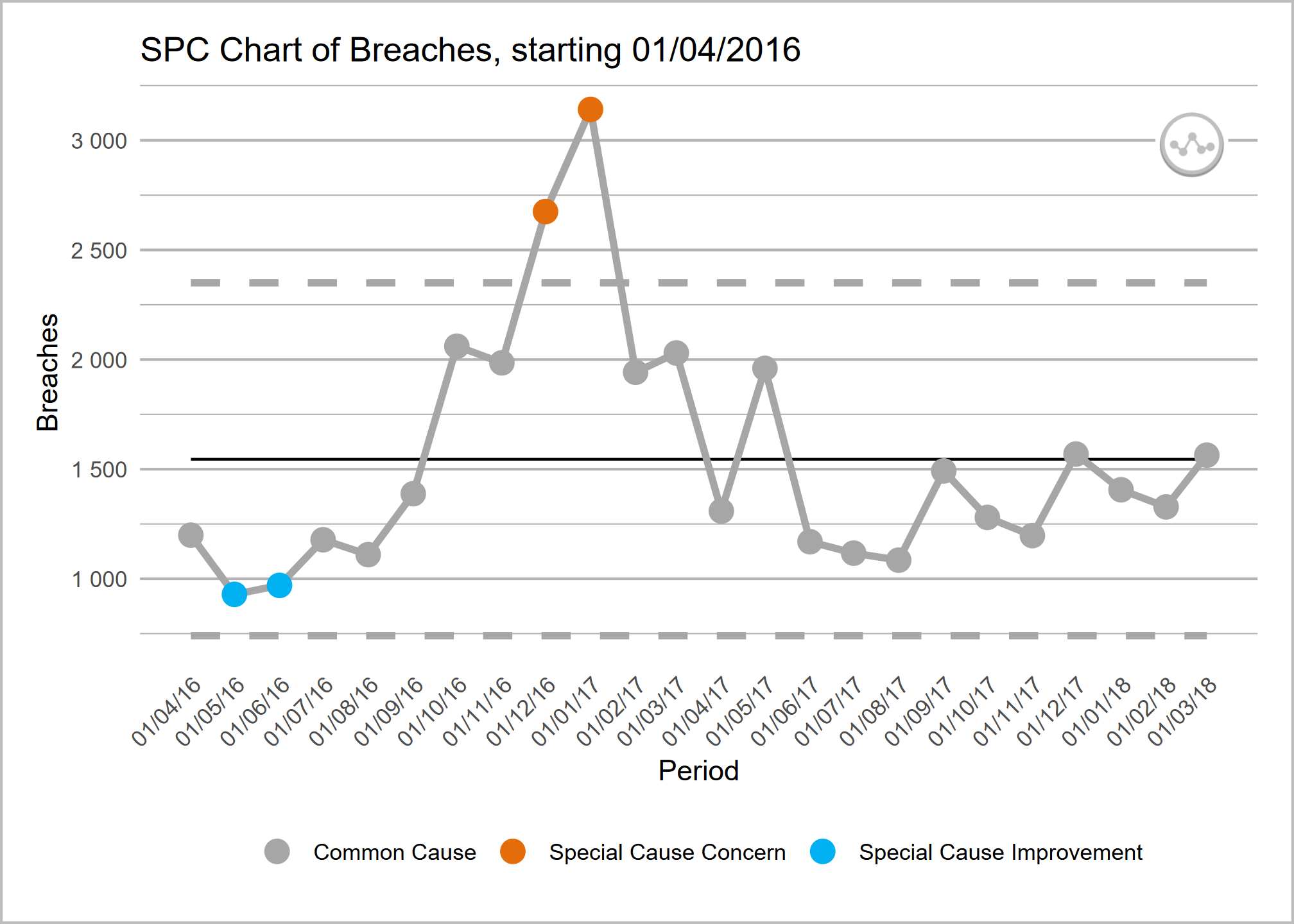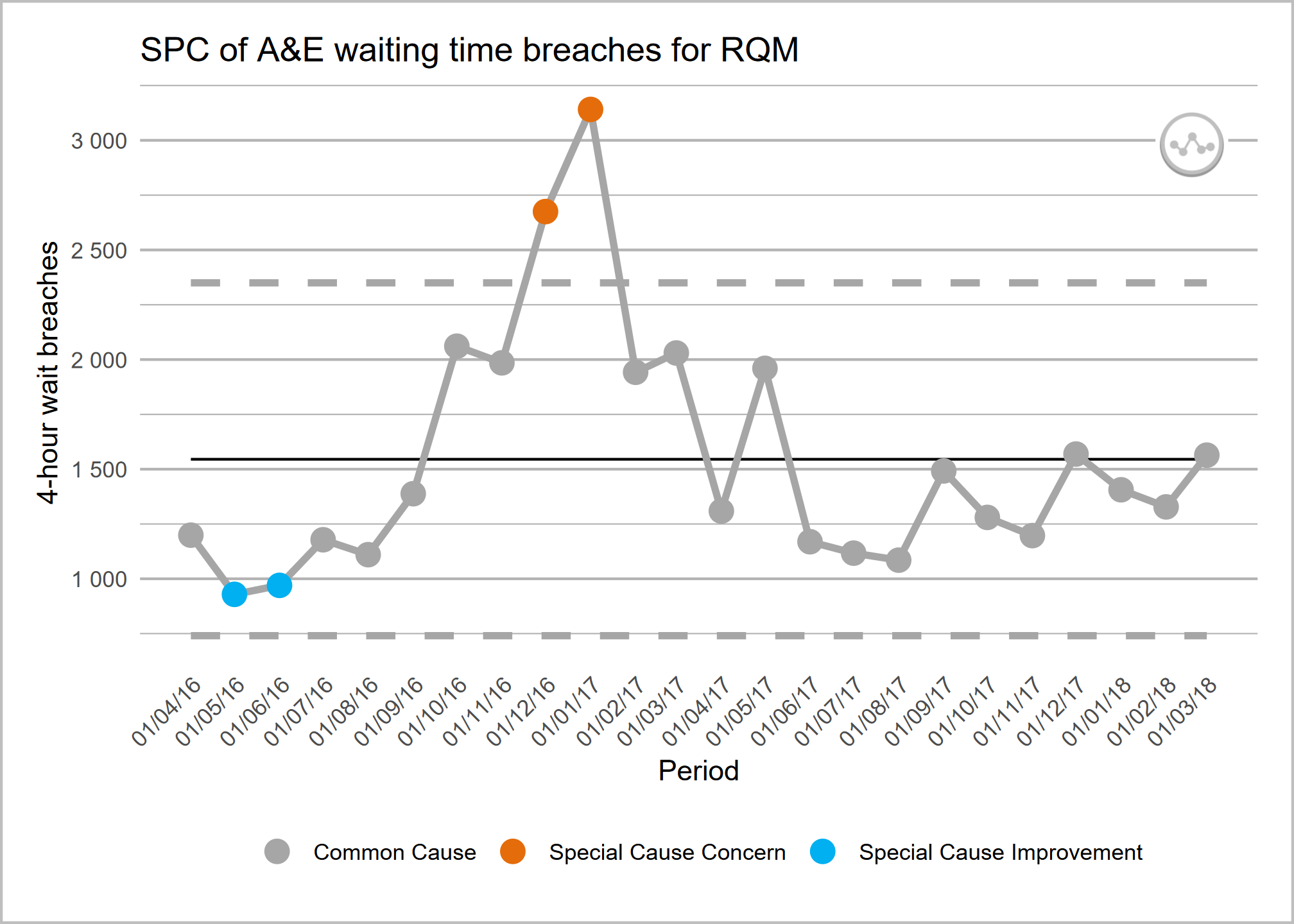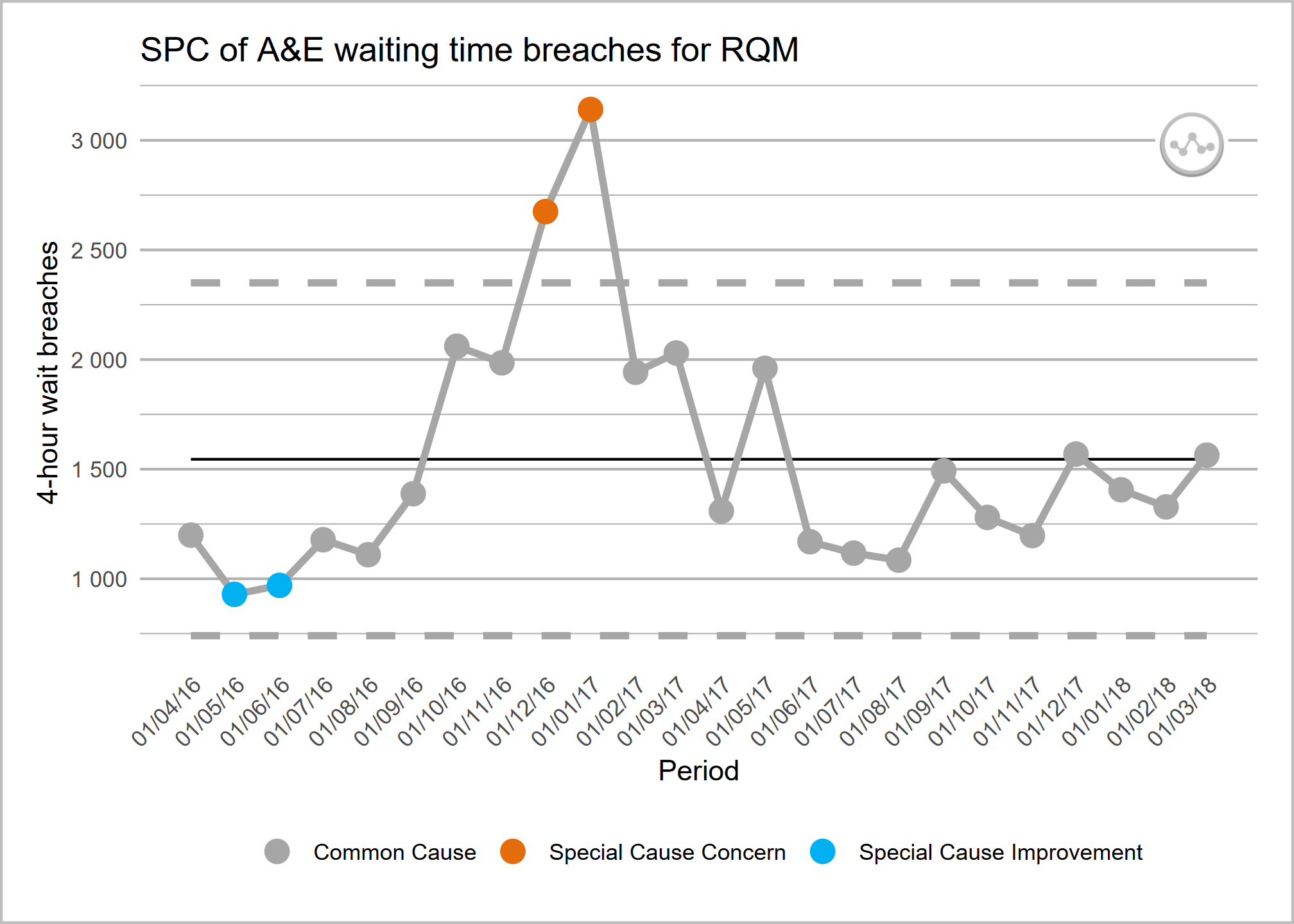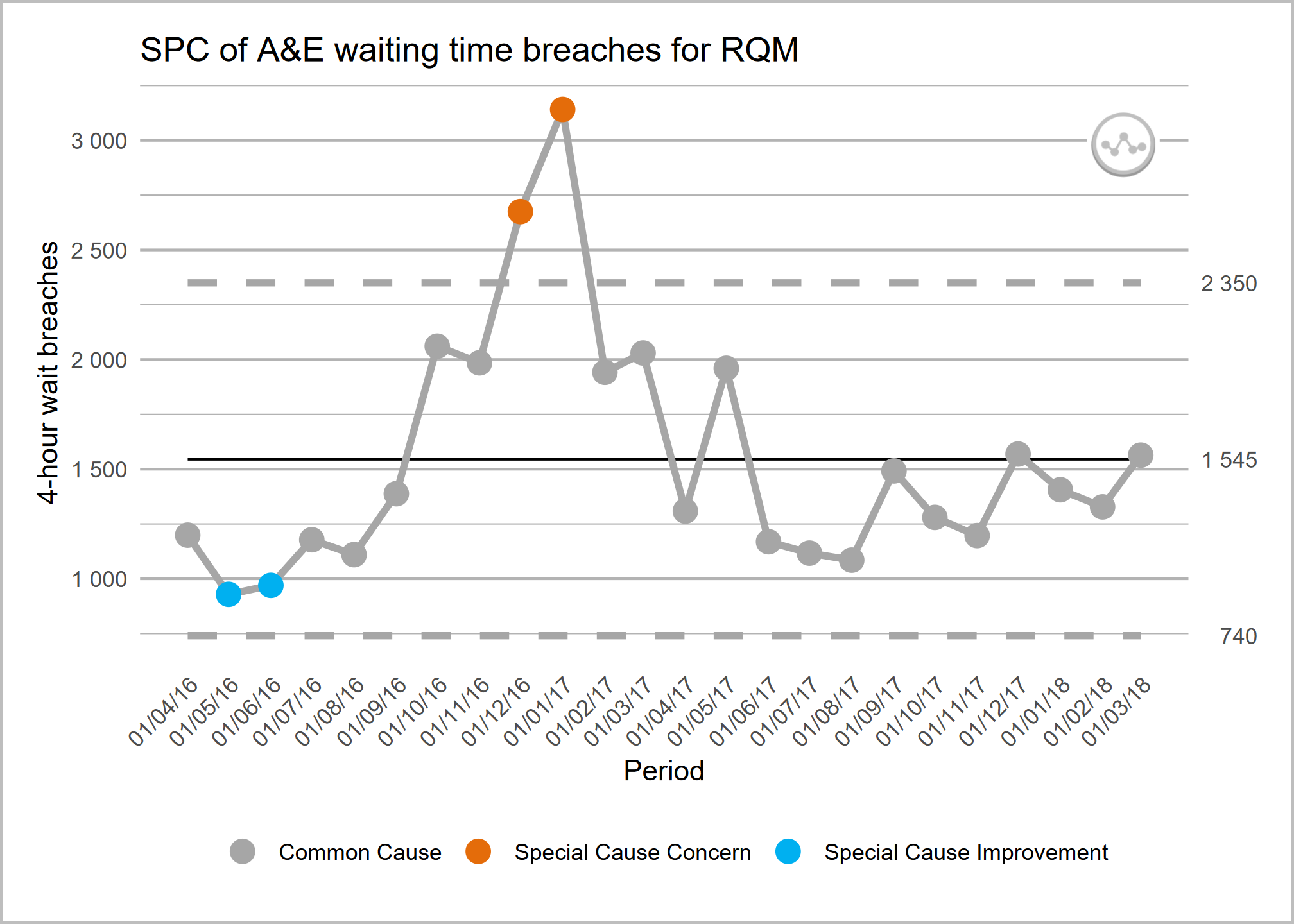NHSRplotthedots

The hardware and bandwidth for this mirror is donated by dogado GmbH, the Webhosting and Full Service-Cloud Provider. Check out our Wordpress Tutorial.
If you wish to report a bug, or if you are interested in having us mirror your free-software or open-source project, please feel free to contact us at mirror[@]dogado.de.
This package is built by the NHS-R community to provide tools for drawing statistical process control (SPC) charts. This package supports NHS England’s ‘Making Data Count’ programme, and allows users to draw XmR charts, use change points, and apply rules with summary indicators for when rules are breached.
Please be aware that this package is in the early stages of development, and features may change.
# install from CRAN
install.packages("NHSRplotthedots")
# Or install the development version from GitHub using {remotes} package:
# install.packages("remotes")
remotes::install_github("https://github.com/nhs-r-community/NHSRplotthedots",
build_vignettes = TRUE)If any charts that you are creating don’t have the variation flags in
the top right and instead are a c this because you are
running the old version v0.1 of the package. Please install the latest
version v0.2 to resolve this.
Welcome to the NHS-R community’s package for building a specific type of statistical process control (SPC) chart, the XmR chart. The package supports the NHS’s ‘Making Data Count’ programme. The programme encourages boards, managers, and analyst teams to present data in ways that show change over time and drive better understanding of indicators than ‘RAG’ (red, amber, green) rated board reports often present.
The help files and vignettes within this package tell you more about
the possible options for controlling the charts, but below are some
simple examples of the type of chart the package produces. We will use
the ae_attendances dataset from the
NHSRdatasets package and a bit of dplyr code
to select some organisations.
library(NHSRplotthedots)
library(NHSRdatasets)
library(dplyr)
sub_set <- ae_attendances |>
filter(org_code == "RQM", type == 1, period < as.Date("2018-04-01"))
sub_set |>
ptd_spc(
value_field = breaches,
date_field = period,
improvement_direction = "decrease"
)
This plot is ok on its own, but we can specify more control options
if we explicitly pass it on to the plot() function
sub_set |>
ptd_spc(
value_field = breaches,
date_field = period,
improvement_direction = "decrease"
) |>
plot(
y_axis_label = "4-hour wait breaches",
main_title = "SPC of A&E waiting time breaches for RQM"
)
or, equivalently:
sub_set |>
ptd_spc(
value_field = breaches,
date_field = period,
improvement_direction = "decrease"
) |>
ptd_create_ggplot(
y_axis_label = "4-hour wait breaches",
main_title = "SPC of A&E waiting time breaches for RQM"
)
You can also use the summary() function to get some
basic statistics about your SPC data frame. The function prints the SPC
options, and then returns the summarised results as a table:
summary_df <- sub_set |>
ptd_spc(
value_field = breaches,
date_field = period,
improvement_direction = "decrease",
target = 1200
) |>
summary()
#> Plot the Dots SPC options:
#> ================================
#> value_field: 'breaches'
#> date_field: 'period'
#> facet_field: not set
#> rebase: not set
#> fix_after_n_points: not set
#> improvement_direction:'decrease'
#> target: '1200'
#> trajectory: not set
#> screen_outliers: 'TRUE'
#> --------------------------------You could assign this summary table to a variable and use it later:
# base R -----------------
summary_df$variation_type
#> [1] "common_cause"
summary_df$assurance_type
#> [1] "inconsistent"
# tidyverse -----------------
summary_df |>
select(variation_type) |>
pull()
#> [1] "common_cause"
summary_df |>
select(assurance_type) |>
pull()
#> [1] "inconsistent"It’s also possible to generate interactive plots using the
plotly package by replacing the call to plot
with ptd_create_plotly(). This function takes the same
arguments as plot/ptd_create_ggplot().
sub_set |>
ptd_spc(
value_field = breaches,
date_field = period,
improvement_direction = "decrease"
) |>
ptd_create_plotly(
y_axis_label = "4-hour wait breaches",
main_title = "SPC of A&E waiting time breaches for RQM"
)The package (in development and will be available from later releases) supports annotating the values of the mean and the upper and lower process limits on a secondary (right-hand side) y axis, if this is helpful for you and your audience.
The way to achieve this is to turn on the label_limits
option:
sub_set |>
ptd_spc(
value_field = breaches,
date_field = period,
improvement_direction = "decrease"
) |>
ptd_create_ggplot(
y_axis_label = "4-hour wait breaches",
main_title = "SPC of A&E waiting time breaches for RQM",
label_limits = TRUE
)
If you have rebased the chart, the mean and process limit annotations will only show for the most recent section.
To find out more about the ptd_spc() function, you can
view the help with:
?ptd_spcwhen the package is loaded. Otherwise type in the console:
??ptd_spcDetails on the extra plot controls can be found using:
?ptd_create_ggplotTo view the vignette (worked example), use:
vignette("intro", package = "NHSRplotthedots")
vignette(package = "NHSRplotthedots")Please see our guidance on how to contribute.
This project is released with a Contributor Code of Conduct. By contributing to this project, you agree to abide by its terms.
The simplest way to contribute is to raise an issue detailing the feature or functionality you would like to see added, or any unexpected behaviour or bugs you have experienced.
These binaries (installable software) and packages are in development.
They may not be fully stable and should be used with caution. We make no claims about them.
Health stats visible at Monitor.